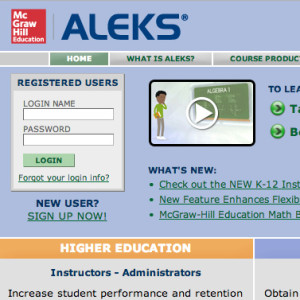 ALEKS math placement assessment will be coming as a requirement for the first time this fall in 2014.
ALEKS math placement assessment will be coming as a requirement for the first time this fall in 2014.
No worries! There are exemptions and positive outcomes:
To be exempt, students must have a C- or higher in a transfer equivalent math course within the previous 18 months from the date of enrollment.
This includes transfer students, current DMACC students, Postsecondary Secondary Enrollment Open (PSEO), and Career Advantage students.
According to DMACC’s website, “ALEKS is the Assessment and LEarning in Knowledge Spaces. A web-based, artificially intelligent assessment and learning system designed to help determine which math course students are prepared to begin. Each math placement assessment consists of a maximum of 30 questions uniquely adapted according to student’s responses.
“Admitted students to DMACC are encouraged to take the ALEKS math placement assessment prior to attending orientation and/or meeting with an advisor to schedule classes. Taking the assessment early will allow you to complete the Prep and Learning Modules and take another assessment if you do not perform as well as you think you should.
“After completing the initial ALEKS Placement Assessment, students will have access to a six-week Prep and Learning Module. ALEKS Prep Course is a good option if students didn’t reach the minimum score for the DMACC math course that the student would like to enroll in.”
Meaning, if a student doesn’t get the score needed to enroll in the class that is required for their degree, they have up to five times to retake it. Having the prepping tools to help them get a better score to enroll in the class that they are hoping to take.
Students have access to the Learning Module for a six week limit and the clock starts running once students open their Prep Course. Don’t start the Learning Module until having the time to use it. Students can also purchase an additional six weeks at: www.ALEKS.com.
Also according to the DMACC’s website, “ALEKS is not a multiple-choice assessment so it’s important you understand how to use the ALEKS interface. Before the assessment begins, complete the tutorial which shows you how to enter different types of answers, how to use the ALEKS calculator, and how to graph.”
Dr. Kim Linduska is the Executive Vice President of Academic Affairs. She explains the change:
“Our math faculty has been looking at the persistent rate, the retention rate and the grades of all our students. Math is one of our toughest subjects and we were just not satisfied with our students not passing the class or dropping out of the class. We were looking for other ways for students to be successful. We didn’t want math to be a barrier,” Linduska said.
After looking around, the faculty looked at different ways for students to get into the right math classes. They found that ALEKS would be a great tool for students to be successful. Part of the reason the faculty decided to use ALEKS was because all three regent universities use the ALEKS as their math placement.
Many students may not have had a math class in quite some time, making it hard for them to know what math class to take. The math faculty doesn’t want math to be a barrier for students, but want students to take a class that is required for their degree and not according to their level.
Not knowing which math class to take, students may come to fail the class; having to retake it, or pass with a very poor grade making it harder for the next math class that is required. So, if a student is coming to DMACC and have taken a math class in the past and want to transfer to Iowa State, the student would have to take the ALEKS anyway.
Joel Overton, a Mathematics Professor at the DMACC Urban Campus, explains that the math faculty and DMACC didn’t want to call this assessment a test.
“We want to sell it as an assessment and not a test. The idea of the word ‘assessment’ is trying to figure out how to get students the best way to place them in the right class; so students can achieve success,” Overton said.
ALEKS is not meant to scare anyone, but wanting students to get access to these great tools that help students in a significant way. ALEKS is an assessment which allows students to be placed in a math class at their level of understanding, and a way for students to succeed in the class rather than failing.
“The Compass Test didn’t do that good of a job in placing students in the correct courses. We didn’t see enough correlation of success in the courses they were placed into the courses they were tested in. So we were looking for a better tool that does that for us, and so far it looks like ALEKS is going to be it,” Overton said.
“Our basic philosophy is, ‘We are trying to remove hurdles from students getting to where they need to be.’ The purpose of the assessment isn’t to put another thing in front of a student and say, ‘Here is another hoop to jump through in order to graduate’ or ‘this is what has to be done to get further in the academic career.’ The idea is to put them in the proper place so they can achieve success,” Overton said.
Before the mandatory assessment, students were taking courses that they were not qualified to take. Failing the course or dropping out, or even taking the course over and over again which is a waste of time and money. Then there were the students who were taking courses that are too easy for them, losing interest and never attending, also having the same outcome.
“The assessment is a tool to get them into the courses they need. This assessment is a powerful tool for those who have also been away for a while. It gives them an idea of what they forgot. The assessment itself is real dynamic. It starts out with some questions and engages the student’s responses.
“If they miss these questions, it gives them some easier ones, if they answer the problems correctly, it give them harder ones. Every student gets a unique assessment according to their ability, enabling them to figure out, ‘this is what the person knows, this is what they don’t,’ ” Overton said.
Aaron Ulrich, 18, who will be transferring to ISU, likes the idea of ALEKS. “I think it’s a good idea to help students be placed at a level of education according to the assessment. It helps students get where they need to be.”
Taylor Putney, 18, a nursing major also agrees with Ulrich, “It’s pretty smart because everybody is obviously at different levels and if you don’t know what level you’re at, this assessment will be very helpful. I like it because I don’t know what level I’m at.”
Megan Rahm, 20, also a nursing major said, “I think it’s smart, especially if you haven’t taken a math class in a while. Like if you didn’t start college for a long time, you would be able to determine where you are at by taking this assessment. If not, and you take a class learning everything new, you may not pass. Or if you don’t know what you are learning, it might be harder to understand and you might get a poor grade.”





Comments